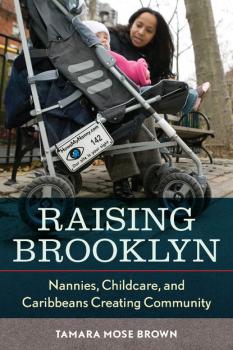ТОП просматриваемых книг сайта:
Tamara R. Mose
Список книг автора Tamara R. MoseАннотация
Stroll through any public park in Brooklyn on a weekday afternoon and you will see black women with white children at every turn. Many of these women are of Caribbean descent, and they have long been a crucial component of New York’s economy, providing childcare for white middle- and upper-middleclass families. Raising Brooklyn offers an in-depth look at the daily lives of these childcare providers, examining the important roles they play in the families whose children they help to raise. Tamara Mose Brown spent three years immersed in these Brooklyn communities: in public parks, public libraries, and living as a fellow resident among their employers, and her intimate tour of the public spaces of gentrified Brooklyn deepens our understanding of how these women use their collective lives to combat the isolation felt during the workday as a domestic worker.Though at first glance these childcare providers appear isolated and exploited—and this is the case for many—Mose Brown shows that their daily interactions in the social spaces they create allow their collective lives and cultural identities to flourish. Raising Brooklyn demonstrates how these daily interactions form a continuous expression of cultural preservation as a weapon against difficult working conditions, examining how this process unfolds through the use of cell phones, food sharing, and informal economic systems. Ultimately, Raising Brooklyn places the organization of domestic workers within the framework of a social justice movement, creating a dialogue between workers who don’t believe their exploitative work conditions will change and an organization whose members believe change can come about through public displays of solidarity.
Аннотация
A playdate is an organized meeting where parents come together with their children at a public or private location to interact socially or “play.” Children no longer simply “go out and play,” rather, play is arranged, scheduled, and parentally-approved and supervised. How do these playdates happen? Who gets asked and who doesn’t? What is acceptable play behavior? In The Playdate, Tamara R. Mose focuses on the parents of young children in New York City to explore how the shift from spontaneous and child-directed play to managed and adult-arranged playdates reveals the structures of modern parenting and the new realities of childhood. Mose argues that with the rise of moral panics surrounding child abuse, pedophilia, and fears about safety in the city, as well as helicopter parenting, and over-scheduling, the playdate has emerged as not just a necessity in terms of security and scheduling, but as the very hallmark of good parenting. Based on interviews with parents, teachers, childcare directors, and nannies from Brooklyn, Manhattan, Queens, and Long Island, the book provides a first-hand account of the strategies used by middle-class parents of young children to navigate social relationships—their own and those of their children. Mose shows how parents use playdates to improve their own experiences of raising children in New York City while at the same time carefully managing and ensuring their own social and cultural capital. Mose illustrates how the organization of playdates influences parents’ work lives, friendships, and public childrearing performances, and demonstrates how this may potentially influence the social development of both children and parents. Ultimately, this captivating and well-researched book shows that the playdate is much more than just “child’s play.” Tamara Mose on The Brian Lehrer Show


